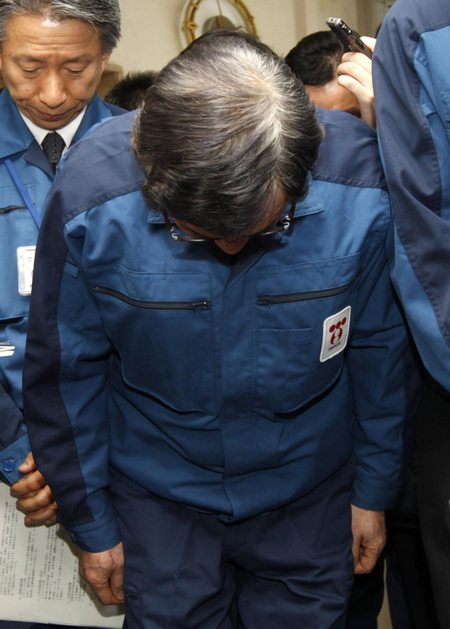Nuclear Meltdown
Japan sets to extend nuclear evacuation zone
(Agencies)
Updated: 2011-04-11 11:09
 |
Large Medium Small |
|
 Tokyo Electric Power Co President Masataka Shimizu bows in front of the media after a meeting with Japan's Vice Trade Minister Motohisa Ikeda at the Nuclear Disaster Countermeasures Office in Fukushima, northern Japan April 11, 2011.[Photo/Agencies] |
TOKYO - Japan plans to extend the evacuation zone around its crippled nuclear plant because of high radiation levels, local media reported on Monday, with engineers no closer to regaining control of six reactors hit by a giant tsunami one month ago.
Concern at Japan's inability contain its nuclear crisis, caused by a March 11 earthquake and tsunami, is mounting with Prime Minister Naoto Kan's ruling party suffering embarrassing ?losses in local elections on Sunday.
Engineers at the damaged Fukushima Daiichi plant north of Tokyo said on Sunday they were no closer to restoring the plant's cooling system which is critical if overheated fuel rods are to be cooled and the six reactors brought under control.
They are hoping to stop pumping radioactive water into the ocean on Monday, days later than planned.
Four weeks after the worst nuclear crisis since Chernobyl quarter of a century ago, the government was moving to extend a 20 km (12 mile) evacuation zone due to high levels of radiation, the Asahi newspaper reported.
The government has so far refused to widen the zone, despite being urged to by the International Atomic Energy Agency (IAEA)and countries like the United States and Australia advising its citizens to stay 80 kms away from the plant.
The Asahi said the government would extend the zone to 30 kms in certain areas, depending on wind direction, and residents would be given a week to prepare for evacuation.
The Japan Times said authorities would soon forcibly close the 20 km zone, stopping people returning to their shattered homes to pick through the rubble for belongings.
Fukushima Governor Yuhei Sato criticised the evacuation policy, saying residents in a 20-30 km radius were initially told to stay indoors and then advised to evacuate voluntarily.
"Residents in the 20-30 km radius were really confused about what to do." Sato told NHK television on Sunday.
Media reports said that Sato would refuse to meet the president of Tokyo Electric Power Co (TEPCO) he visits the area on Monday.
It is Japan's worst crisis since World War Two after a 9.0 magnitude earthquake and a huge tsunami battered its northeast coast, leaving nearly 28,000 dead or missing and rocking the world's third-largest economy.
POLITICAL FALLOUT
Japanese voters on Sunday vented their anger at the government's handling of the nuclear and humanitarian crisis, with Kan's ruling Democratic Party of Japan losing nearly 70 seats in local elections.
The unpopular Kan was already under pressure to step down before the March 11, but analysts say he is unlikely to be forced out during the crisis, set to drag on for months.
?"The great disaster was a double tragedy for Japan. The first tragedy was the catastrophe caused by the earthquake, tsunami and the nuclear accident. The other misfortune was that the disaster resulted in prolonging Prime Minister Kan's time in office," Sankei newspaper said in an editorial on Monday.
In Tokyo, around 5,000 people took to the streets in two separate anti-nuclear protests on Sunday.
South Korea has criticised Japan's handling of the nuclear crisis, with Seoul calling it incompetent, reflecting growing international unease over the month-long atomic disaster and the spread of radiation.
Japan's economy, the world's third largest, is reeling from the triple disaster and several countries have banned or restricted food imports after detecting radiation.
More critically, the nuclear crisis and power shortages have disrupted Japan's manufacturing and electronics global supply chains, hitting computer and automakers in particular.
Bank of Japan Governor Masaaki Shirakawa on Monday reiterated that the economy is likely to return to a recovery path once supply constraints caused by last month's earthquake and tsunami ease, and as exports grow.???
RADIOACTIVE SEAWATER
TEPCO has struggled to regain control of its nuclear plant.
It is currently pumping nitrogen into reactors to counter a build up of hydrogen and prevent another explosion sending more radiation into the air.
"We cannot say what the outlook is for the next stage," ?Hidehiko Nishiyama, a deputy director-general of the Nuclear and Industrial Safety Agency (NISA) said on Sunday.
In a desperate move to cool highly radioactive fuel rods, TEPCO has pumped water onto reactors, some of which have experienced partial meltdown.
But the strategy has hindered moves to restore the plant's internal cooling system, critical to end the crisis, as engineers have had to focus how to store 60,000 tonnes of contaminated water.
Engineers have been forced to pump low-level radioactive water, left by the tsunami, back into the sea in order to free up storage capacity for highly contaminated water from reactors.
($1=85.475 Japanese yen)?
| 分享按鈕 |